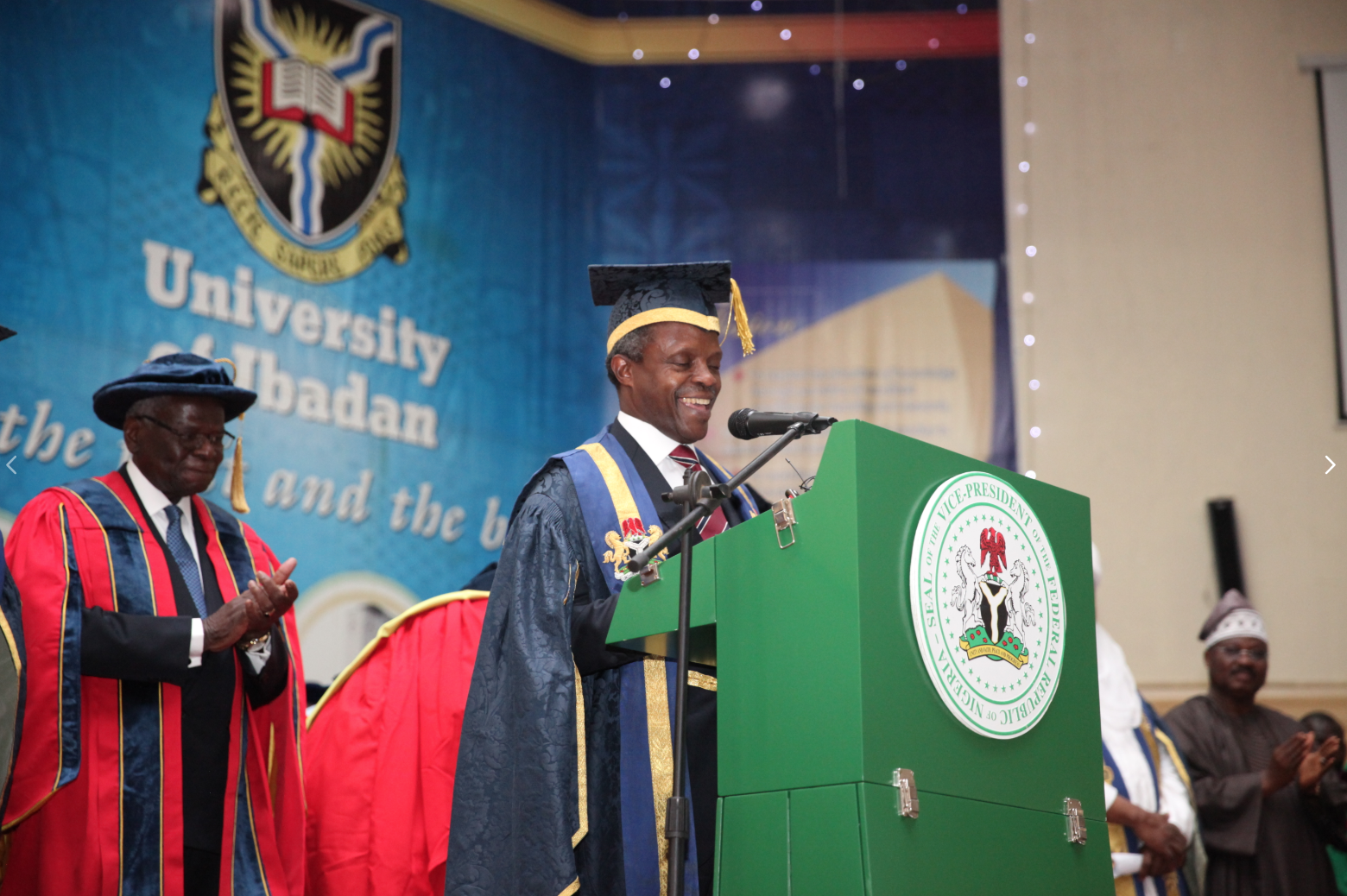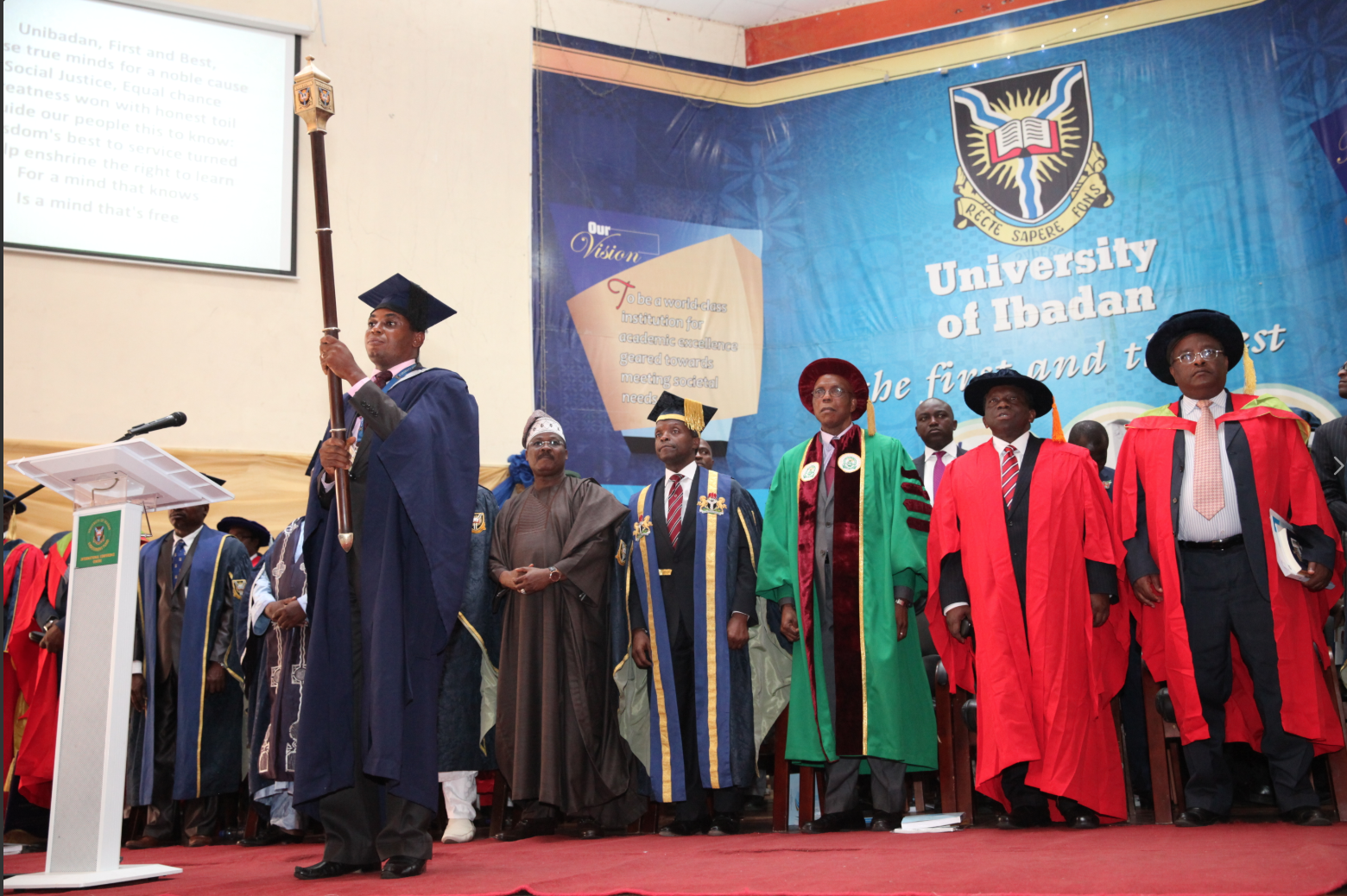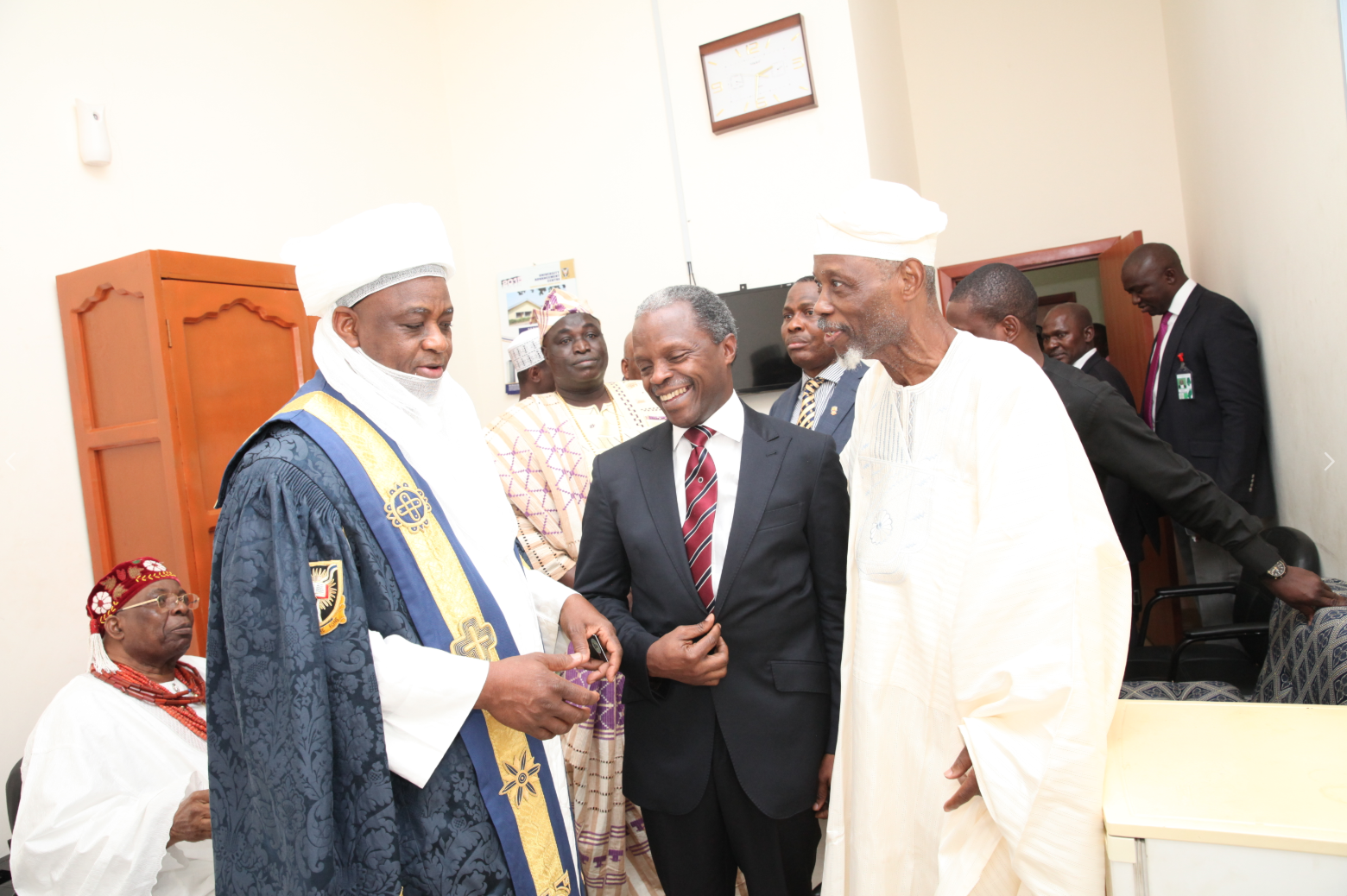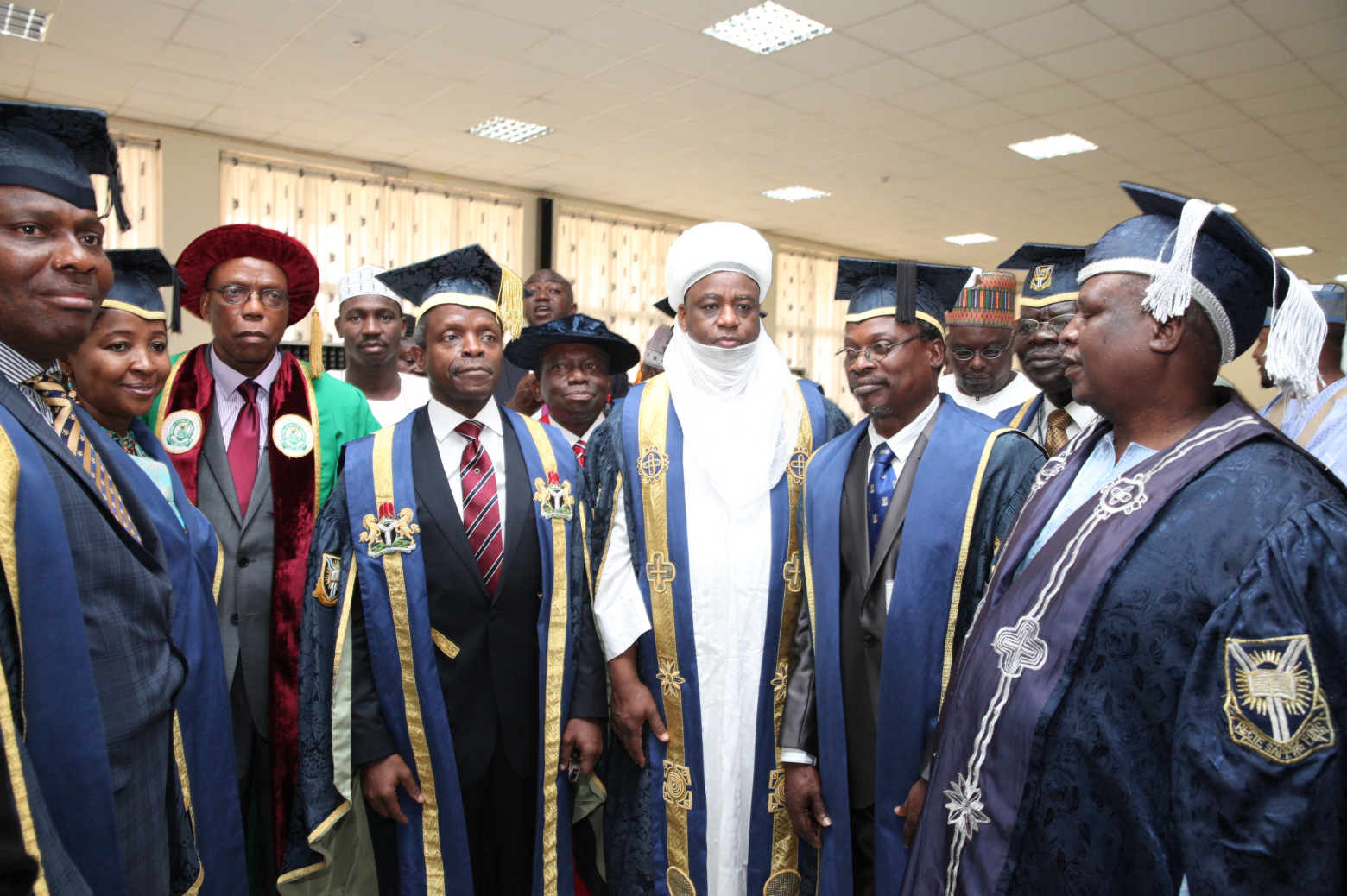67th Foundation Day Celebration And Convocation Ceremony Of University Of Ibadan
SPEECH BY HIS EXCELLENCY, MUHAMMADU BUHARI, GCFR, PRESIDENT AND COMMANDER-IN-CHIEF OF THE ARMED FORCES, FEDERAL REPUBLIC OF NIGERIA DELIVERED BY HIS EXCELLENCY, VICE PRESIDENT, PROF. YEMI OSINBAJO, SAN, GCON, AT THE 67TH FOUNDATION DAY CELEBRATION AND CONVOCATION CEREMONY OF THE UNIVERSITY OF IBADAN, ON TUESDAY, 17TH NOVEMBER, 2015.
PROTOCOLS
It is my singular honour and pleasure to be here at this celebration of the 67th Foundation Day of the University of Ibadan which is first and the best. Today marks another milestone in the history of this great institution, a day of appreciation to God for sparing our lives to witness yet another convocation ceremony. I, therefore, seize this unique opportunity to rejoice with the Governing Council, Management, staff and students.
Let me join many others in congratulating our graduands of today and of the last three days, their parents, relations, friends, well-wishers as well as the entire University community for these remarkable achievements. Many sacrifices led to the glory of this day. The deprivations that your parents and sponsors had to endure to provide some comfort for you while here these past years, and the hard work, and painstaking efforts of each of you all deserve commendation. Thankfully, also the atmosphere of peace and tranquillity on this campus these past few years made it possible for most of you to complete your courses within the statutory period.
Let me reiterate here that we are encouraged by the recent ranking of the University of Ibadan in Nigeria and Africa; the University which was rated 1st in Nigeria and 8th in Africa by Journal Consortium. Moreover, the Times Higher Education World University Rankings 2015-2016 placed Ibadan among the 601-800 Top Universities in the world. A lot still needs to be done for further improvement and repositioning. The University is, therefore, challenged to work harder in its vigorous pursuit of academic excellence to achieve its vision to be a world-class institution.
It is equally worthy of note, to congratulate the African Union for the sound decision to establish the Pan African University, for which, this University is the hub for the West African region, in the thematic area of Life and Earth Sciences. We have just witnessed the graduation of the first set of students drawn from various countries of Africa. I am glad to note that this continental initiative is a huge success and I hereby reaffirm the commitment and support of the Nigerian government to this laudable objective. This is a veritable way for this university to deepen her internationalization drive, especially in attracting foreign students and faculty in the years ahead.
I must also congratulate His Eminence, Alhaji Sa’ad Abubakar III, the Sultan of Sokoto, who, earlier today, was installed as the Chancellor of the University and conferred with the Degree of LLD (Doctor of Laws) Honoris Causa. Much as this is another feather to your cap, it is yet another call to service, and I have no doubt that the University of Ibadan will benefit from your wealth of experience and your innovative ideas on peace and nation-building.
May I also felicitate with Emeritus Professor Ayo Banjo, who today earns the preferment of Doctor of Literature Honoris Causa.
On a rather sad note, I sincerely commiserate with the University and the family of the late Deacon Gamaliel O. Onosode, one of the illustrious alumnus of the University and a former Pro-Chancellor and Chairman of Council of this Institution. The outstanding contributions of this iconic Boardroom guru to this University and the country are too numerous to highlight in this short speech. We pray for the repose of his great soul.
The Governing Council and the entire University community must also be congratulated for the smooth process in the appointment of a new Vice-Chancellor in the person of Professor Abel Idowu Olayinka, who will take over from the former Vice-Chancellor, now Honourable Minister of the Federal Republic of Nigeria, Professor Isaac Folorunso Adewole, on 1st of December 2015.
Chancellor Sir, graduands and distinguished guests, the world we live in is a vastly different place from what it was even a decade ago. And every day, deep and profound changes are taking place in the way we do business, the way we communicate, how and what we read, how we get our news, the competition for jobs, the skills set for business and entrepreneurship and the expectations of a more sophisticated consumer society. The assumptions we made only a decade ago are no longer valid, new paradigms are emerging daily. Just to take a few examples. In the recent past, the only way to do retail business in fashion items was to own a shop with a nice shop window to display the items. Today a great deal of shopping is online. This of course means that costs may go down and soon it may be difficult for a shop owner to compete at all with his online competitor.
Many newspapers today are not doing as well in sales as they did only a decade ago. Why? Many people now get their news online. Besides, social media gets the news out real-time 24/7. By the time the newspaper gets to the vendor in the morning, social media has published the news. In any case, in this era of the so-called Citizen Journalist, who really is a journalist? Or perhaps I should ask who now is not a journalist? With thousands of online academies today, offering certified well-recognised programmes in every discipline, the nature of teaching and learning has changed for good.
The question is not whether an academic institution will offer online courses, it is when? How about the new globalisation and the internalization of human capital? Today, the job market is international; the phenomenon of outsourcing of jobs has made it possible for qualified young people to live in Nigeria and work in America or for a Japanese company based in Japan. What are the other big issues in our world that require great ideas to resolve? In Africa we are constantly reminded that we are the last frontier for socio-economic development.
Extreme poverty and the attendant depressing literacy, infant and maternal mortality statistics also daily remind us of how poorly the political, business and intellectual elite in our nations have responded to the major issues of development so far. In Nigeria, we are confronted with the phenomenon of GDP growth while unemployment figures rise. For the intellectual elite, my question is what are the great ideas on economic policy that will ensure that while we are building the Industrial and technological base for the future we are able to address the questions of extreme poverty of the largest numbers of our people? What is the economic model that will ensure inclusive growth?
Chancellor Sir, the time we are in call for uncommon creativity, innovation and courage. There must be a re-thinking of some of the time-worn economic ideas and myths that held us bound to a few options. In 2008, western economies faced with what Ben Bernanke, then Chairman of US Federal Reserves Ban described as the “deepest financial crisis since the Great Depression” abandoned conventional free-market thinking and embraced State bankrolled stimulus plans to forestall the imminent collapse of their economies.
This proved once and for all that the monster called the economy cannot be allowed to prowl the streets with its free-wheeling, free-market struts without the leash of a trainer. So we must ask ourselves some tough questions. Do African economies not require a different paradigm? How can trickle down paradigms work when half of our population are extremely poor? Do we not need some attention to social investment? Conditional Cash Transfers to the poorest segments, Universal Primary Healthcare Schemes, school feeding programs that can energise local economies and create important multiplier in our economy.
How do we address the huge challenges and implications of climate change when the technology that is affordable is not climate-friendly? How do we leverage technology to deliver mass education, especially in disciplines crucial to development but which are undersubscribed such as, Science, Technology, Engineering, Mathematics? How can we begin to leverage on technology to improve literacy?
Mr. Chancellor Sir, just on another track, how do we at an intellectual and philosophical level, challenge the morbid ideologies that inform the terrorist movements all over the world? ISIS, AL-QAEDA, Boko Haram? What is the counter-narrative to the perverse and devious ideas of those who claim that somehow God Almighty is interested in the mindless and indiscriminate killing of the innocent in the market places and places of worship? Because these rabid ideas are finding disciples even amongst well educated and positioned young people, it is our duty to present a counter world view that is both persuasive and enduring.
Three things will determine the future; creativity, technology and character. Creativity- I repeat creativity, technology and character because the limits of the technology itself will be set by the profundity of human creativity. Creative thinking, thinking outside the box, will determine the position on the success scale for individuals and communities. Character because it is the depth of human resilience, discipline and doggedness that determines the quality and longevity of success. To borrow from Awo’s famous adaptation of the Scriptures, “only the deep can call to the deep,” we need not mention that of the three, character is the most crucial. Without sound values, nothing we do will endure.
Our country is full of talents, our leaders are full of ideas but the character deficit destroys the most vital compulsory thing. Therefore, our Change Agenda is national re-orientation beginning from the children in schools to the rest of the people. By its very tradition, the university is the place for the birthing, nurturing and propagation of the ideas, concepts and inventions that would determine the future. I challenge you in this great citadel of ideas, to take on that responsibility with commitment.
Government is determined to fight corruption at all levels including in our tertiary institutions. We cannot speak of effective and efficient funding of the education sub-sector if our universities are mired in crises, confusion, fraud and lack of institutional vision.
As part of the measure to curb corruption, Government has introduced for implementation, the Treasury Single Account (TSA) in all its Ministries/Departments/Agencies to which I have been duly informed that the tertiary education sub-sector has fully complied. However, my attention has been drawn to the need to give the university sector a special consideration in the implementation of the TSA because of the peculiarities of the sector. You will agree with me that this, in no small measure, will prevent diversion and misappropriation of Government funds.
Distinguished Ladies and gentlemen, I am particularly impressed with the level of development that has taken place in this University. The serenity and ambience of the campus are highly commendable, and I wish to again appreciate the Vice-Chancellor and his Management team for this. In addition, I am pleased to note that there exists a virile Student Union in the University. This is a veritable platform towards entrenching modern democratic values and ethos in the young generation.
Distinguished Ladies and Gentlemen, once again, I congratulate the University of Ibadan, the graduands and the honorary degree awardees on their achievements. As the University is celebrating its 67th Foundation Day, it is my ardent hope and prayer that it will continue to grow in strength and be even more resolved to work for the greater glory of our dear country.
On our part as the government of the Federation, we are committed to responsible and responsive governance. We will obey the laws of the land, uphold the rule of law; our policy of zero-tolerance for corruption is firm and without exception. We will insist that both the public and private sectors must be held to the highest standards of transparency and accountability in dealing with the Nigerian people.
The major focus of our economic policy is the ordinary man, especially the youths. The focus of every policy is job creation. The question that decides the priority of our policies is how many jobs will this create?
Our next budget will focus on the rapid development of critical infrastructure- roads, rail transport, power sector and technology.
We cannot bring about the much needed economic growth and prosperity without putting in place the necessary infrastructure.
In the power sector, we will move away from the excessive use of thermal and hydro sources to renewable energy- especially solar power. The vast majority of Nigerians who are not served by the national grid shall be reached with solar power.
We recently signed an agreement with the United Kingdom (UK) under the Energy Africa Scheme which will provide support for solar power, especially in places hitherto without access to power.
Diversification of our economy is for us, not mere rhetoric. We are determined to develop agriculture and the agro-allied value chain. For example, our plan for self-sustenance in rice production is on track. The provision of silos and milling machines is a priority.
The promotion of entrepreneurship is critical. We are cleaning up the process of providing capital to small to medium scale enterprises. We will support our creative young men and women to start-up business- small businesses are the major provider of jobs in every economy.
Despite the sharp drop in oil earnings and the down-turn in the global economy- we are convinced that the future of Nigeria is very bright indeed.
With discipline, integrity, hard work and commitment; our nation will yield its fruits to the Nigerian people. Our young people will find decent jobs; our nation will provide succour for the elderly and those who cannot work.
This nation has the resources, human and material, to enable us all to live decently. It has enough to ensure that we do not beg on the streets. All that is required is the commitment, faithfulness and a determination to succeed.
I am convinced that the Nigerian people have what it takes and by the grace of God, we will succeed as a nation.
Thank you for listening.
Thank you all, and God bless our dear nation.
"The world we live in is a vastly different place from what it was even a decade ago. And every day, deep and profound changes are taking place in the way we do business, the way we communicate, how and what we read, how we get our news, the competition for jobs, the skills set for business and entrepreneurship and the expectations of a more sophisticated consumer society. The assumptions we made only a decade ago are no longer valid, new paradigms are emerging daily."





